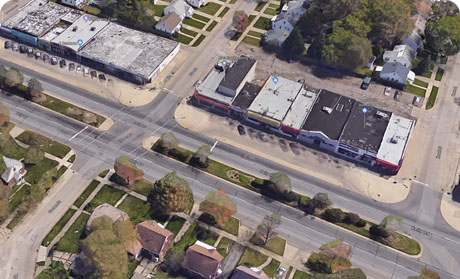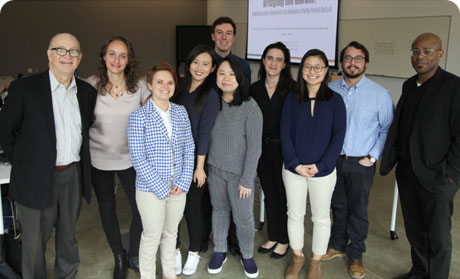Read the full report

Kelly Road forms the 1.2 mile-long boundary between Greater Regent Park, a neighborhood in northeast Detroit, and Harper Woods, a small suburb of Detroit.
Leaders from the City of Harper Woods and LifeBUILDERS, a non-profit organization serving the Greater Regent Park community in northeast Detroit, asked a team of eight graduate students from the Taubman University of Michigan Urban and Regional Planning Program to identify strategies to enhance retail and economic vitality. The project was shaped by community engagement that included resident focus groups and interviews, along with a survey of area business owners along the corridor. Urban Planning’s Harley Etienne and Eric Dueweke identified the Capstone project and led their students through the research and design process.
Kelly Road forms the border between the cities of Detroit and Harper Woods in the northeast corner of Wayne County, Michigan. It was once a thriving commercial corridor, providing goods and services for local residents. In the present day, Kelly Road struggles with vacancy, blight, and declining economic activity.
Kelly Road is remembered by many residents as a vibrant, family-centered retail and residential corridor that served the neighboring communities. As population and incomes declined, Kelly Road suffered from disinvestment which resulted in many commercial vacancies and a loss of vibrancy. The imminent closing of Eastland Center, a large shopping mall located in Harper Woods, adds to the declining retail landscape.
“Kelly Road had a diner called TJs and it was a Friday night staple where family could meet. Waitresses knew what your kids ate…Kelly Road was a social atmosphere,” said one resident.
“Biggest thing is teenagers that don’t have a place to hang out. [We need] some kind of place for kids to go.” said another.

Bridging the Border Team: Grace Cho, Yu-Hung Kuo, JP Mansolf, Michelle Rubin, Anna Shires, Jordan Solano-Reed, Dewi Tan, Emilie Yonan
Through research, the collaborative effort crafted recommendations to strengthen the retail corridor in ways that reflect the desires of residents and business owners. Recommendations focus on recapturing revenue lost to alternative shopping destinations, galvanizing business owners and their consumers to further invest in the corridor, and reviving the local economy by:
- Increasing the variety of retail businesses
- Marketing Kelly Road
- Encouraging local entrepreneurship
- Supporting existing business owners
- Improving consumers’ opinions on quality of goods and services
Read the full report





